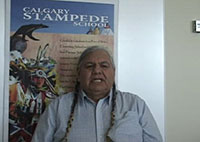
"I just wanna say that uh, I come from the Blackfoot Piikani culture and we were part of the tribes that moved into the Stampede in 1912. Our culture's an oral culture and today's culture is a mix of written and oral culture and sometimes when you have a mix when you look at concepts where we don't understand somebody elses culture so we might look at those concepts as cultural confusion.
I just want to say one day we had a visit with our old timers and gathered them up together to talk the world we live in today and that world was um, a viewing... seeing the world outside, outside from our community; we speak Blackfoot, we have oral practices and ceremonies, when we teach our kids school it's a oral practice, when we make decisions for our communities it's an oral practice and if we're going to look at the outside world we have to look at it from that oral practice and language and that's what I want to talk a bit about.
We live in an oral world andthat oral practice allows us to view. Now at the beginning of the visit from our elders they talked about Akoksskaaapiikoan "Who are white men thinkers?" They said white nmen thinkers came from different lands. Now in the early years, when the first contact between white men and Indian, when the white man first came into this country, they came with a belief system that they had a God. Their God gave them dominion to all creation. Now, that's their belief system. Now when we look at the practice that came out of dominion, we talked about writing and we talked about English language and other languages. That was a practice that came out that was a part of all their institutions whether it's government, church, education and it's a part of today's world in Canada. Now the products that come out of this white man practice of writing are called things that are called that will show authority for example your drivers license. Maybe you bought a car and you have registration, you bought a horse and you wanna have ownership papers, you graduated at the University and you have a degree or you moved from grade 3 to grade 4 you have a report card so certificates, licenses those are all the written documentations of authority that we carry. So today to survive in Canada we have to think in the concept of written system that was introduced to us by the white people that came. We asked our elders what were Indian thinkers Akak`stiman and they said 'Well, our creator told us that we believed that everything was equal; land, plants, human beings, stars, water, air - everything created by creator was equal. And then out of that basic belief that we are equal, we extracted a practice and that practice is an oral practice and our language which is a part of our when we're gonna teach our young kids, when we're gonna make decisions for our community that oral practice is important.
Now, if I wanted to show ownership of authority from an oral practice, this is where the concepts of songs comes in. There are songs for everything creator created and we have to get those songs through ceremonies and in the ceremony you show your ability and qualifications to get a song and if the ceremony lists agree you'll get the song then you'll get the song. So, our songs will show our qualifications so if the old days they were looking for a leader they'd say 'Well how many songs does this leader have, what kind of songs are they?'. So, that was a Indian thing that came from an oral process that came from a belief that we're all equal.
So, those are the two thinkers we're looking at today. As we look at the information going onto the website and onto the Stampede School, we're going to be talking in two different thought paradigms. One in the Indian thought mind and the other one is a white man thought mind and the items we talk about are going to be items that can be recognized from both sides, whether they're teepee designs, whether they're stories, whther they're cooking, whether they're making crafts or dancing. But these are topics we can understand from both sides from an oral concept and a written concept. I think we find parallels is where we can understand others to come and invite them in, to come in and share culture in our language or in western language." |





